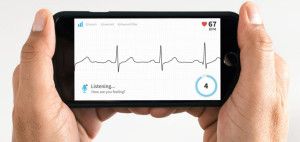NHS rolls out new tech across London to prevent 924 strokes, save 231 lives and £20.6 million annually
 Thousands of patients to benefit from increased diagnosis of irregular heart rhythms.
Thousands of patients to benefit from increased diagnosis of irregular heart rhythms.
Innovative technology is being rolled out across London to prevent strokes as part of a national campaign launched today (15 February)
More than 1,200 devices including mobile electrocardiogram (ECG) units are being distributed to GP practices, pharmacies and NHS community clinics across London during National Heart Month this February. The range of tech being rolled out can detect irregular heart rhythm quickly and easily, enabling NHS staff to refer any patients with irregular heart rhythms for follow up as they could be at risk of severe stroke.
Experts estimate that more than 420,000 people across England have undiagnosed irregular heart rhythm, which can cause a stroke if not detected and treated appropriately, usually through blood-thinning medication to prevent clots that lead to stroke.
The range of technology includes a smartphone-linked device that works via an app and a new blood pressure cuff that also detects heart rhythms. Small and easy-to-use, NHS staff can also take the devices on home visits and allow more staff in more settings to quickly and easily conduct pulse checks.
The mobile devices provide a far more sensitive and specific pulse check than a manual check and this reduces costly and unnecessary 12 lead ECGs to confirm diagnosis. As a result, the project aims to identify 45,474 new cases of irregular heart rhythms (known as Atrial Fibrillation) over two years, which could prevent at least 924 strokes and save £20.6 million in associated health and costs annually.
The devices are being rolled out by the 15 NHS and care innovation bodies, known as Academic Health Science Networks, in the first six months of this year as part of an NHS England-funded project.
Professor Gary Ford, Stroke Physician and lead on the project for the Academic Health Science Networks said:
“More than 420,000 people throughout England are unaware they have irregular heart rhythms and of the dangers that this can pose to their health. We have highly effective treatments that can prevent these strokes, but early detection is key. Using cost-effective technology, the NHS will now be able to identify people with irregular heart rhythms quickly and easily. This will save lives.
“As the NHS approaches its 70th birthday this year, this is also a great reminder of the way that healthcare is continually evolving and innovating. Taking advantage of digital health solutions will be even more important for the next 70 years. Today’s new devices are just one example of the way that low-cost tech has the potential to make a huge difference.”
Professor Stephen Powis, Medical Director of NHS England, said:
“Cardiovascular disease kills more people in this country than anything else, but there are steps we can all take to prevent it. These innovations have enormous potential to prevent thousands of strokes each year, which is why NHS England has committed to funding the rollout of 6,000 mobile ECG devices to help identify cases of atrial fibrillation so behaviours can be changed and treatment started before strokes occur.
“We are also encouraging people, during National Heart Month, to learn how to check their own pulse so we can catch even more cases.”
One million people in the UK are known to be affected by AF and an additional 422,600 people are undiagnosed. As the most common type of irregular heart rhythm, it is responsible for approximately 20% of all strokes. Survivors must live with the disabling consequences and treating the condition costs the NHS over £2.2 billion each year.
The rollout is being unveiled during National Heart Month. Every February is National Heart Month. This year the British Heart Foundation is encouraging everyone to make small changes towards a healthier lifestyle. See more here.
The public are being encouraged to spread the word about irregular heart rhythm and urge friends and family – particularly those aged over 65 – to check their pulse and see a GP if it is irregular. Pulse checks can be done manually (a British Heart Foundation video and guide shows how here) or through new technology, with irregular rhythms investigated further by healthcare professionals.
The hashtag being used to help raise awareness is #KnowYourPulse